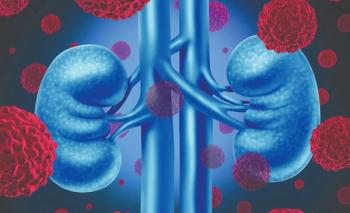
Oncology NEWS International
- Oncology NEWS International Vol 8 No 12
- Volume 8
- Issue 12
Music Therapist Helps Cancer Patients Speak Through Song
NEW YORK-The 24-year-old patient recuperating from a bone marrow transplant in a hospital room at Memorial Sloan-Kettering Cancer Center was depressed and not communicating. The staff thought Lucanne Magill, the hospital music therapist, could help.
NEW YORKThe 24-year-old patient recuperating from a bone marrow transplant in a hospital room at Memorial Sloan-Kettering Cancer Center was depressed and not communicating. The staff thought Lucanne Magill, the hospital music therapist, could help.
I went four times to his room with my guitar to ask if he would like to hear a song, Ms. Magill, who is a PhD candidate, said at a press briefing introducing Memorials new Integrative Medicine Service. The fifth time, he said Play if you want. So I sat in his room and played two soft songs that had to do with the mountains and countryside.
One of the songs she chose was Take Me Home, Country Road because I thought he might be thinking of going home. During that song, he pulled out his tape recorder and began to record Ms. Magill as she sang. This was the beginning of a series of visits that were centered around music.
During one such visit, the patient told Ms. Magill he was very concerned about his marriage and didnt know what to say to his wife anymore. She suggested he write his wife a song, but he said he did not know how to write songs. So I told him to write her a letter, and I would put it to music. It took us about an hour.
The song became a wonderful gift for him to give to his wife, she said, and it enhanced his self-esteem, as he was able to share the song with staff members whenever they entered his room. It helped him build a network of support, Ms. Magill said. He began to feel freer to talk about his anger and frustration, and the process also helped him cope better with his pain and suffering.
Music has the potential to soothe patients, distract them from their pain, and quickly change their mood, she said. It helps reduce the sense of suffering that compounds the pain experience.
Work With Children
Ms. Magill also works with outpatients and with families, including the young children of cancer patients. I help them explore their fears and fantasies within the framework of music, she said. One little boy created his own fantasy song. It had to do with a person who was being killed in a war, and it exposed a lot of fear the child was having.
Creating songs not only gives children a chance to reveal their feelings, she said, but also gives an opportunity for the music therapist to substitute reality for the childs fantasies, which helps decrease their anxiety. I remind children that their parents sickness has nothing to do with anything theyve done, and that the parent still loves them, Ms. Magill said. Just seeing the place where her mother was staying helped ease the fears of one little girl, she recalled.
Another little girl learned the song, Que Sera, which begins, When I was just a little girl, I asked my mother and includes several characters. All the characters in the song became important figures to the little girl and gave her strength, Ms. Magill said.
Ms. Magill, who has worked at Memorial Sloan-Kettering for more than 2 decades, is now a part of the hospitals new Integrative Medicine Service, which offers patients complementary therapies such as massage and meditation as well as music therapy and many others. (For other articles on this new service, see Oncology News International, Sept. 1999, page 1, and Nov. 1999, page 2.)
These therapies, Ms. Magill said, help patients feel in touch with their own well being and sense of worth, which helps them cope and helps the medical treatment go smoothly.
Articles in this issue
over 26 years ago
SWOG to Study Docetaxel/Estramustine in Advanced Prostate Cancerover 26 years ago
US Smoking Rates No Longer Falling, Due to More Young Smokersover 26 years ago
Americans Favor Higher Cigarette Tax to Balance the Budgetover 26 years ago
Saint Vincents Hospital Opens Comprehensive Cancer Centerover 26 years ago
New Breast Biopsy Techniques Allow ‘One-Stop’ Proceduresover 26 years ago
Director of NCI Mentioned as a Candidate to Head NIHover 26 years ago
Challenges in Designing Chemoprevention Trialsover 26 years ago
Black Women Underrepresented in Breast Cancer Trialsover 26 years ago
UnitedHealthcare Plan Gives Physicians Final Say on Careover 26 years ago
New Agents, Sequential Schedules Hold PromiseNewsletter
Stay up to date on recent advances in the multidisciplinary approach to cancer.



















































